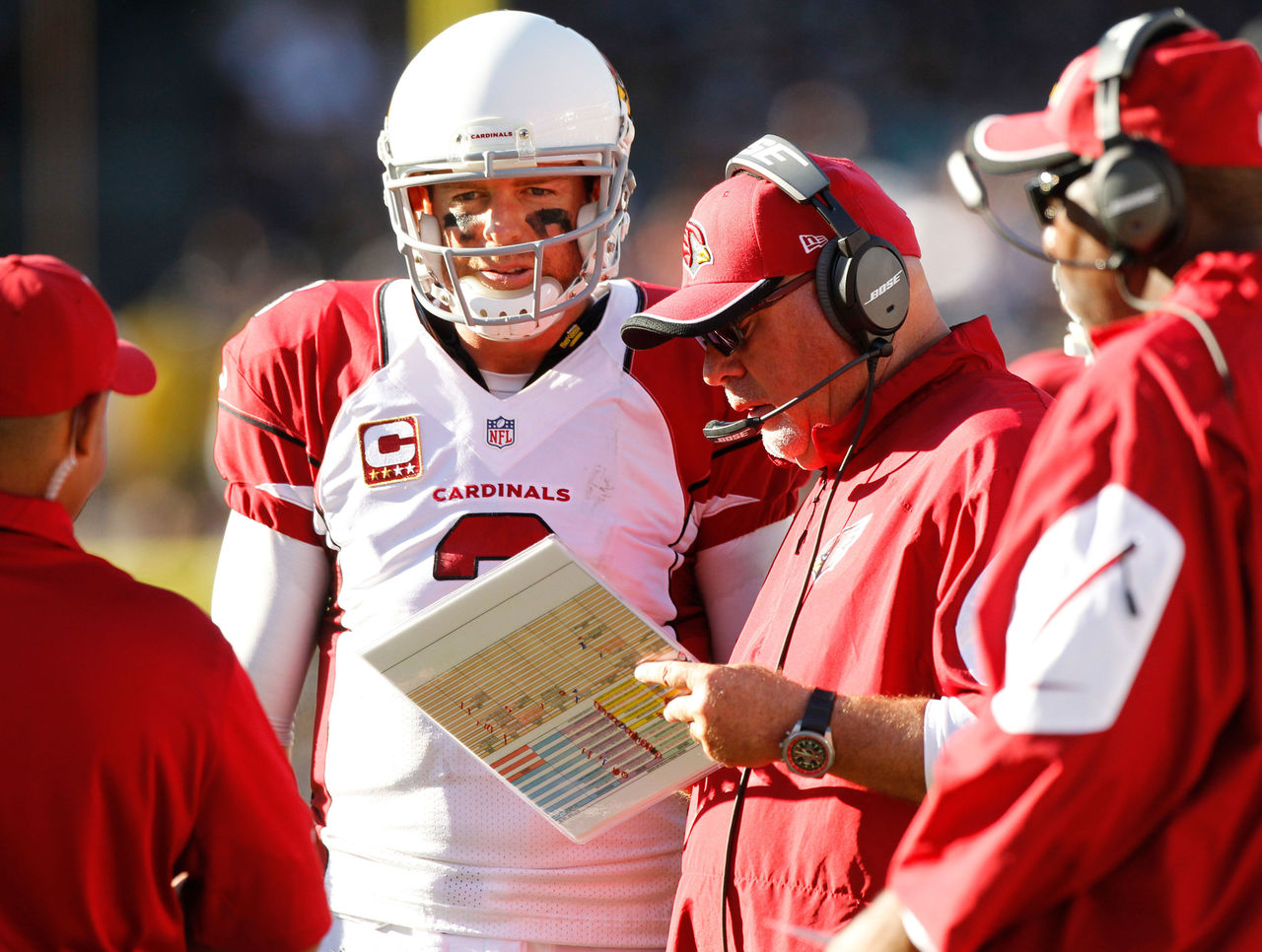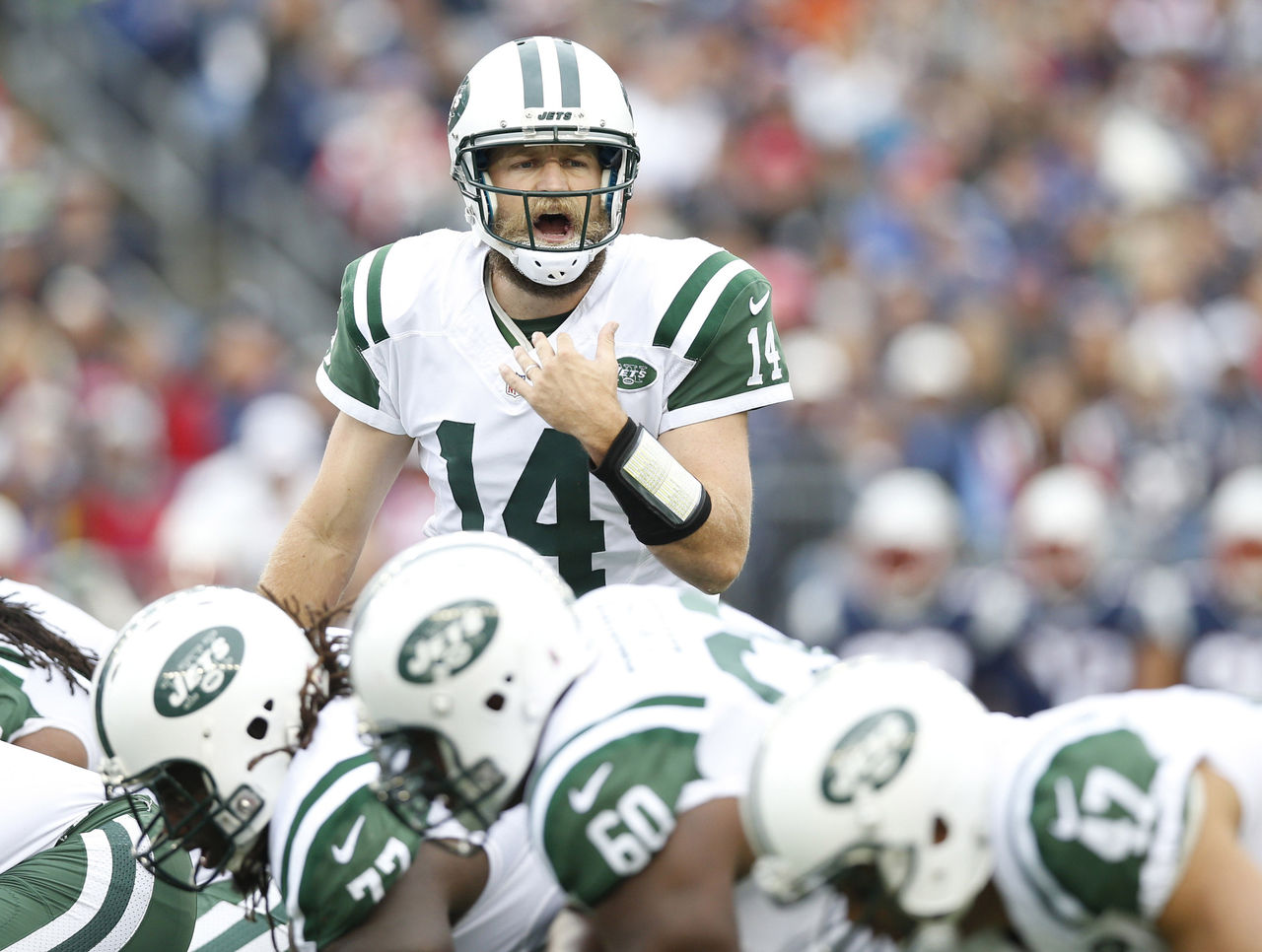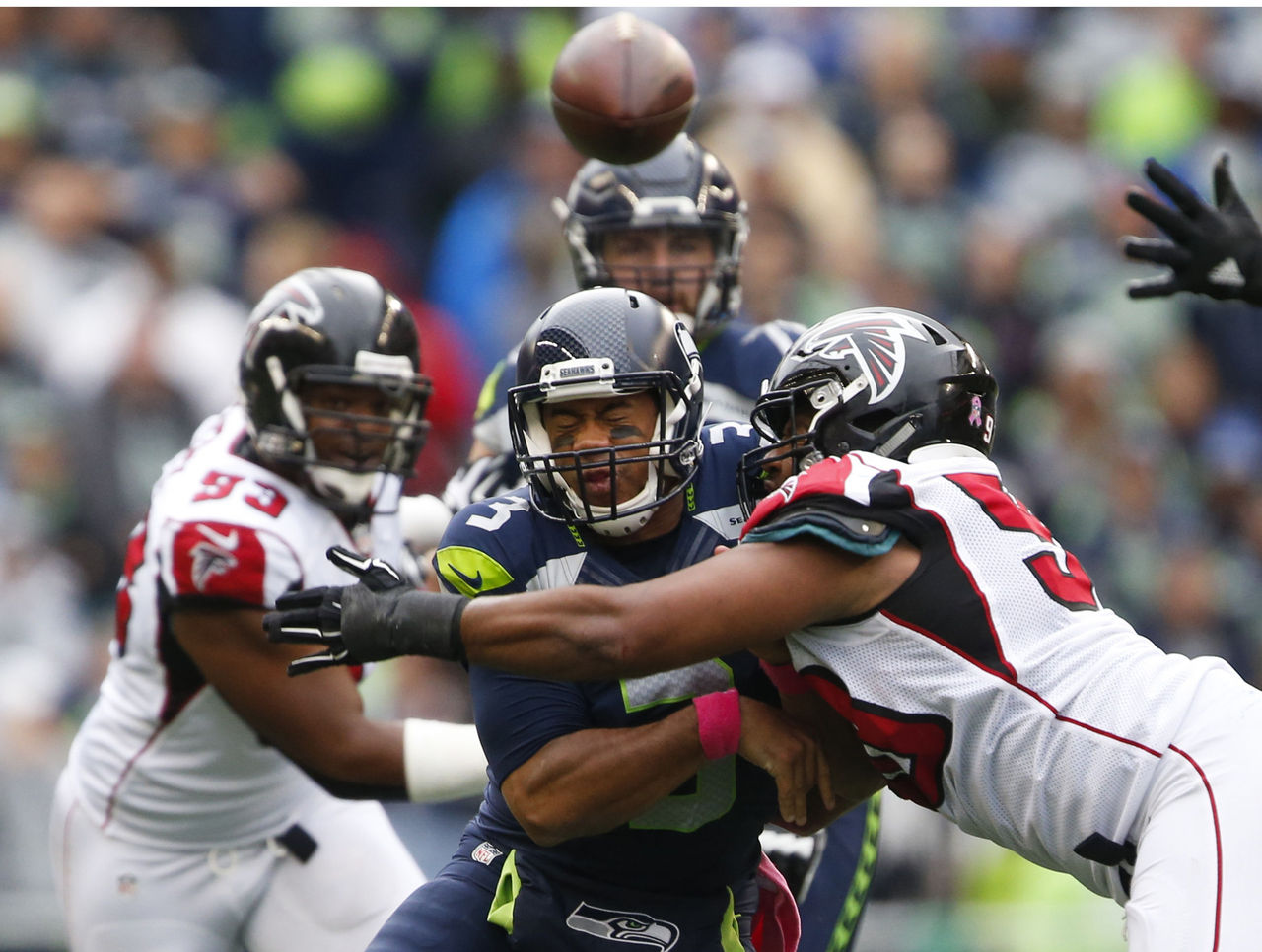Rosenfels: Palmer's textbook fundamentals holding him back
Sage Rosenfels is a former 12-year NFL quarterback who now writes, does radio, and podcasts about the NFL and college football.
Carson Palmer
Training young athletes to become big-time high school or college athletes has become big business. As a former quarterback myself, I too have dipped into this world. Since retiring nearly four years ago, I regularly receive phone calls from parents seeking a tutor for their sons. The ages of the quarterbacks are as young as nine and go all the way to seniors in high school. Whatever their age, I do my best to perfect their throwing motion, footwork, and overall understanding of the game.
As I’ve watched Palmer for the last 14 years in the NFL and during his four years at USC, it is obvious he was well coached on the fine details of playing the position. His drop is quick, consistent, and flawless. His throwing motion is compact, efficient, and fundamentally perfect. His footwork in and around the pocket should be studied and copied as a part of a young signal caller’s training. These fundamentals have been the key to Palmer’s consistent college and pro success. In my opinion, this is precisely the problem.
Palmer grew up in Fresno, Calif., and had such obvious athletic and quarterback potential that his father moved him to southern California and enrolled him at football powerhouse Santa Margarita Catholic High School. Under the instruction of Elite 11 founder Bob Johnson, whose son Rob was also a USC and NFL quarterback, Palmer shined at Santa Margarita. He was listed as one of the country’s top high school QBs and went to USC where he started for three-and-a-half seasons. His final season, under head coach Pete Carroll, Palmer won the Heisman Trophy and was the first pick of the NFL draft a few months later.
Though Palmer has had an extremely strong NFL career with multiple Pro Bowls and has made roughly $150 million, he has yet to win or even play in a Super Bowl. He has struggled in the biggest games at the end of the year. He is rarely called elite. I believe this is because of his inability to play the game "off schedule." His fundamentals are so good that he struggles when he has to create something out of nothing. Rarely do you see Palmer make a clutch play when everything breaks down. Let me explain.
I was lucky to play for a long time in the NFL and with a lot of quarterbacks. Everyone has their own style. I, myself, grew up in a small town in Iowa. I had no youth quarterback training and never wore a helmet until the 8th grade. I played multiple sports and football was basically something I did in the fall. So when I got to college, I had a huge leap to make if I was going to be the starter. I had very little coaching as a youth about the fundamentals of the quarterback position. When I played, I tried to execute as my coaches were teaching me, but when things broke down, I relied on my overall athletic ability to make a play. I threw a lot of passes off my back foot. I would drop down and throw a ball sidearm to find a passing window. I’d escape the pocket to run and throw a ball in an awkward style that couldn’t be practiced. I wasn’t a refined quarterback, but that was fine by my coaches. As long as I tried to play with the correct fundamentals when the play was "on schedule" my ability to ad lib when nothing was there was a strength, not a weakness.

When I look back at the best quarterbacks I played with, Brett Favre and Eli Manning easily top the list. Despite being pocket passers as well, Favre and Manning have made some of the biggest plays of their careers by making throws off balance, underhand, off their back foot, with someone hanging on them, and even left handed. They also do an incredible job of executing with flawless fundamentals when the play design and pocket are perfect. They are a superb mix of execution and ingenuity.
During my rookie year my quarterbacks coach, Brian Schottenheimer, put us through dozens of different quarterback drills. We worked on my very raw drop, pocket presence, throws on the run, and even adjusted my throwing motion to add more velocity. But my favorite drill was the three minutes we got to make “Unusual Throws.” We could literally do whatever we wanted to do, except use good fundamentals. We were like caged animals who were now free to roam. We threw the ball sidearm, behind our backs, left handed, falling away, on the run and across the field, and underhand. Schottenheimer knew what all coaches know. They can coach a quarterback to be perfect until they are red in the face, but at key times during the season great players make great plays, and those can’t always be designed and choreographed.
Favre and Manning are two of the best at this skill. Both were/are great backyard quarterbacks, as well as someone who can execute in a complex system. This is precisely why I believe Palmer hasn’t quite gotten over the top. This is one reason why he hasn’t been included in the elite quarterback conversation. This is a part of why he hasn’t played in a Super Bowl.
Bruce Arians does as good a job as any offensive mind in the NFL at drawing up creative plays. He is on the cutting edge of today’s NFL offenses. Palmer does an extremely good job of executing those plays. His footwork is tremendous. His arm strength and accuracy has not waned as he comes to the twilight of his career. But Arians does know that despite his ability to create concepts to score points, his quarterback needs to make magic happen when the play breaks down.
While Palmer will never be confused with more athletic quarterbacks such as Russell Wilson or Alex Smith, he needs to produce more out of rhythm plays such as Ben Roethlisberger or even Matthew Stafford. If the Cardinals go deep in the playoffs and get back to the Super Bowl, Palmer needs to become more of a slinger, like former Cardinals QB Kurt Warner, and less like the "Robot QB" he was trained to be.
Ryan Fitzpatrick

Fitzpatrick is getting plenty of grief this week in regards to his comments about his head coach, general manager, and his owner. I’m not sure what the problem is.
Yes, Fitzpatrick hasn’t played well this year and has been a turnover machine. Yes, he put his bosses in a position where they had no choice but to bench him. But what he said is true and, to me, not a big deal.
If you get benched as a quarterback, in particular when you had been the unquestioned starter, it isn’t a decision made in haste. This position is so important that a good organization would be on the same page from top to bottom as to why the switch is made.
So what’s the big deal? Fitz has always been the underdog. He wasn’t highly recruited coming out of high school. He wasn’t a first-round draft pick after his career at Harvard. He has bounced around the league for over a decade and has beaten the odds time and time again. I believe he likes being the underdog. This is the fire that has gotten him to this point. He has believed in himself while most of the major college and pro teams have not.
The NFL is a "what have you done for me lately" league. Through five games, the Jets’ brass lost faith in Fitzpatrick. It may be their best way to get him to play his best ball yet!
Russell Wilson

The Seattle offense is hurting. Their quarterback is obviously hurt as well.
During Wilson’s short career, he has become one of the most dangerous quarterbacks in the league. I have him in my top five QBs in the league. He regularly ranks high in nearly every quarterback category. He is as good as there is in the pocket and out of it. He is the best deep ball quarterback in the NFL and can make clutch plays with his feet. But right now, he isn’t the same player.
That's partly because Wilson is not 100 percent. But a lot of it has to do with his offensive line, which is one of the worst in the NFL. They are also one of the lowest paid.
The Seahawks have had to make tough decisions over the last few years as they’ve drafted extremely well, but can’t keep all of their talent under contract. They’ve paid big money to players on defensive line, linebacker, the secondary, wide receiver, and quarterback. There is only so much cash to go around and the offensive line has been left with the scraps.
This isn’t just Wilson’s problem. Rarely does a team advance deep in the playoffs without strong O-Line play. Right now, they can’t run the ball well or protect Wilson to get it out to their weapons in the passing game. Wilson needs to get healthy, but a porous offensive line isn’t going to help that any time soon.
HEADLINES
- Sunday Rundown: Key takeaways from Week 17's biggest games
- NFL Playoff Picture: Postseason seeds, projected draft order
- Purdy's 5 TDs help 49ers top Bears in SNF thriller to stay in mix for 1-seed
- Week 18 schedule: Steelers-Ravens on SNF for AFC North crown
- Eagles hold off Bills as Patriots clinch AFC East